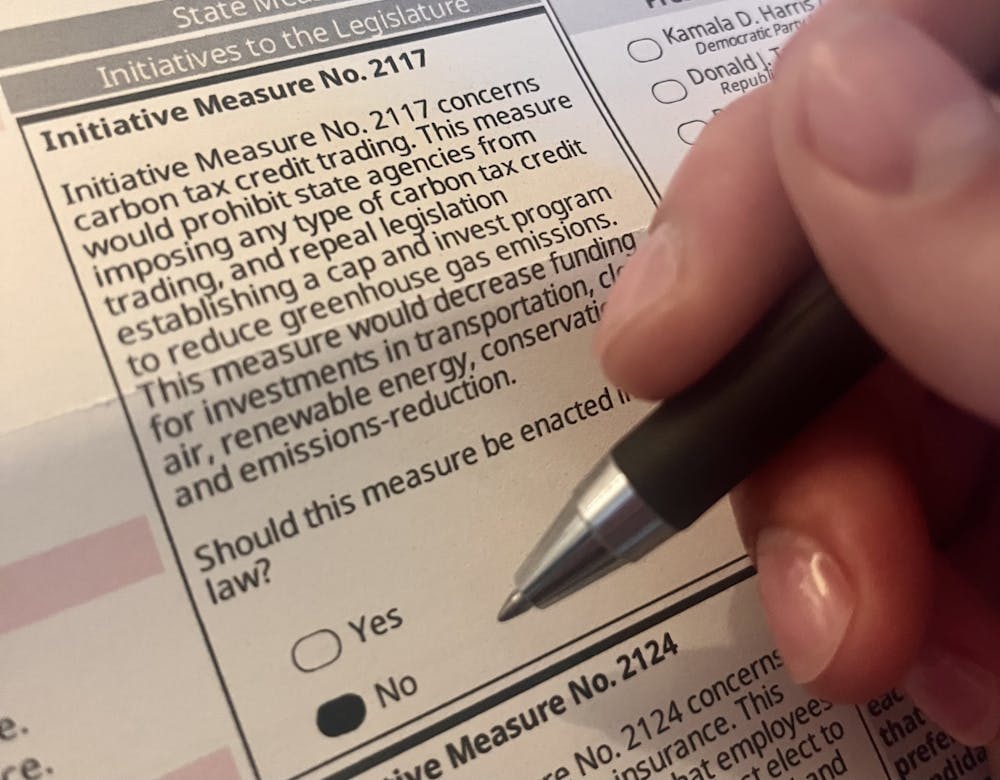Initiative 2117 could repeal Washington State’s Climate Commitment Act, one of the most progressive climate policies in American history. Conservative-founded political group Let’s Go Washington has collected millions of dollars and 400,000 signatures to get the anti-CCA initiative onto the ballots of Washington voters this season.
The state’s leading climate policy charges companies that produce over 25,000 metric tons of yearly carbon emissions to pay for “allowances” using a Cap and Invest Program. These “allowances” have provided over 2 billion dollars towards environmental investments in public transportation, conservation, clean air and renewable energy. The ambitious end goal is to reduce state carbon emissions by 95% by 2050.
“The CCA is mandating that it costs to pollute, which results in more funding for clean, renewable energy sources among other things,” said Alysha Rosio, a 23-year-old political activist and lifelong Washington State resident.
Intrinsic to the 2023-established CCA is an emphasis on environmental justice and equity by providing funding for programs like public transit, climate-related grants for federally recognized tribes, ferry fares, Amtrack fares and air quality projects in public schools and overburdened communities, according to the Washington voters’ pamphlet.
Let’s Go Washington claims CCA works against public interest because it “increased gas prices by nearly 50 cents per gallon.” An analysis from an environmental nonprofit refuted this data, setting the CCA impact to be less than 20 cents per gallon in early 2024.
Other factors like overseas crude oil production costs, refining costs that vary based on region, local market conditions and retailer overhead costs have also contributed to Washington’s regional pricing, according to the U.S. Energy Institute.
Let’s Go Washington’s campaign rhetoric is built around cutting energy costs for low-income workers and families, similar to the goals of the CCA. It’s worth noting that LGW was established by a conservative hedge fund executive and was recently hit with charges of violating campaign finance laws.
“I recognize that higher gas prices can affect some of the least affluent members of our state – people who need to drive their vehicles to work – and it’s unfortunate to think they may share a climate burden that’s disproportionate to their income,” said David Shull, a Western Washington University marine biology professor. “On the other hand, the act they’re trying to repeal is really important for combating the climate crisis.”
In February, PBS shared that oil corporations in the Seattle area posted one of the highest profit margins in the nation at over a dollar per gallon. This dismantles the argument that big oil companies are hurting from the tax and cap program to the point they are forced to drive up prices for consumers.
The Front requested a statement from Let’s Go Washington via phone and email on Oct. 23 and 24, but the group did not respond.
“The cost [of Initiative 2117] only focuses on one sector: the transportation sector, and there are other industries that produce emissions besides vehicles – although vehicles are a very important contributor,” Shull said.
Other sectors qualified for the CCA’s carbon tax credit trading are “industrial facilities, in-state electricity generators, electricity importers and natural gas distributors,” according to the Washington State Legislature. Companies are forced to either cut emissions or pay for carbon “allowances,” which provide billions of dollars for the state’s climate programs.
“The system is not perfect, but for now I support the CCA in that it’s an attempt by a state to do something meaningful to reduce climate emissions, and hopefully other states will follow suit,” Shull said.
Washington is one of the pioneers of state-mandated tax and cap programming, and the CCA is still in the developmental stage.
If Washington’s keystone climate act is revoked this election season, it would set a disparaging precedent for other states’ prospects in adopting more ambitious climate policy.
“Voting ‘no’ to shutting down this act is a pro-future vote to reduce greenhouse gas emissions,” Rosio said.
To vote against I-2117 is to push back against the Trumpian-dystopic political climate in which gutting climate protections is a legitimate possibility for our country.
Over 500 organizations, nonprofits and nationally recognized Washington tribes have formed a diverse coalition in favor of protecting the CCA due to its public benefits.
“[CCA’s] programs help keep our communities healthy and functioning,” said Audrey Stewart, a fourth-year Western student and long-time Washington resident.
To take action to protect the Climate Commitment Act, look no further than your voter’s pamphlet.
“Regardless of their generation, every voter needs to take action in combating the climate crisis,” Shull said.
To preserve Washington State’s legacy as a national leader in climate policy, vote “no” on
Ella Gage (she/her) is a writer for the Opinion section. She's previously written culture-oriented articles for WWU's Rage Mag, as well as investigative environmental articles for the Whatcom Watch. She's a senior minoring in Journalism-Public Relations with a major in Communication Studies. In her free time, she loves good books, good concerts and getting outside. You can reach her at ellagage.thefront@gmail.com.






